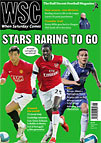 No sooner than Euro 2008 had finished than friendlies and summer tours began. Mark O'Brien remembers a time when football went unnoticed – and you could look forward to the real thing
No sooner than Euro 2008 had finished than friendlies and summer tours began. Mark O'Brien remembers a time when football went unnoticed – and you could look forward to the real thing
All dads have their quirks. Mine’s was his annoyance if anyone, ie me, read his Liverpool Echo before he got in from work. “But the words are all the same, I don’t get it.” “Yes, but you’ve let the newness out.” I thought he was mad at the time, as I was left to pick the paper up off the mat, hold it by my fingertips and pore over the back page but no more. Over the years, though, I have come to understand the simple pleasure of opening an unsullied newspaper. It’s all about neatness, order and anticipation, and in many ways those same feelings always applied to the football season, too.